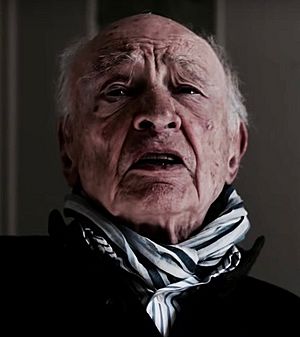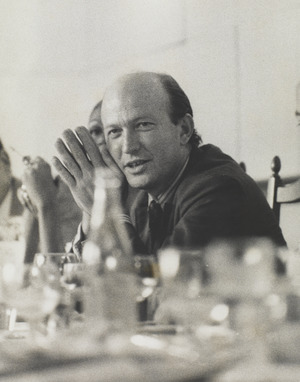Edgar Morin facts for kids
Quick facts for kids
Edgar Morin
|
|
|---|---|
 |
|
| Born |
Edgar Nahoum
8 July 1921 Paris, France
|
| Alma mater | University of Paris |
|
Notable work
|
La méthode (1977–2004, 6 vols.) |
| Spouse(s) |
Violette Chapellaubeau
(m. 1945–1970)Sabah Abouessalam
(m. 2012) |
| School | Continental philosophy Antireductionism Constructivist epistemology Anti-foundationalism |
| Institutions | CNRS, École des hautes études en sciences sociales (EHESS) |
|
Main interests
|
Epistemology Complexity theory Sociology |
|
Notable ideas
|
Polycrisis Complex thought Chaosmos Criticism of structuralism Criticism of Ludwig von Bertalanffy's systems theory autos (auto-(geno-pheno)-eco-re-organization) |
Edgar Morin (born Edgar Nahoum on 8 July 1921) is a famous French thinker and sociologist. He is known for his ideas on "complexity" and "complex thought." He has also contributed to many different areas. These include how we study media, politics, society, and even how we learn.
He studied history, geography, and law. He never got a Ph.D., but he became a very respected scholar. While not as well-known in English-speaking countries, he is famous in France, Europe, and Latin America. He spent most of his career at the École des hautes études en sciences sociales (EHESS) in Paris.
Contents
Edgar Morin's Life Story
Edgar Morin's family moved from Thessaloniki to France in the early 1900s. He was born in Paris. His family was of Sephardic Jewish origin.
Early Years and World War II
In 1936, when he was 15, Morin joined a group that fought against fascism during the Spanish Civil War. Later, he joined another anti-fascist group.
When the Nazis invaded France in 1940, Morin helped people who were trying to escape. He joined the French Resistance, a secret group fighting against the German occupation. He moved to Toulouse and continued studying law. In 1941, he joined the French Communist Party. He also worked with other resistance groups.
After the war, he worked for the French military in Germany. He wrote a book called L'An zéro de l'Allemagne (Germany's Year Zero). In it, he described how the German people felt after their defeat.
He got the name Morin by accident during a Resistance meeting. Someone misheard his name, and it stuck!
Life After the War
In 1945, Morin married Violette Chapellaubeau. They lived in Landau, Germany, where he was a lieutenant in the French army.
In 1946, he returned to Paris. He left the military to work with the Communist Party. However, he started to disagree with the party. He was asked to leave in 1951 after writing a critical article. That same year, he joined the National Center of Scientific Research (CNRS).
In 1955, he helped lead a group against the Algerian War. He believed in finding peaceful solutions. He also started and led a magazine called Arguments from 1954 to 1962. In 1959, he wrote Autocritique, a book about his time in the Communist Party. It explored the dangers of strong beliefs and fooling oneself.
In 1960, Morin traveled a lot in Latin America. He visited Brazil, Chile, and Mexico. When he came back to France, he wrote L'Esprit du Temps, a book about popular culture.
He also helped create a center for studying mass communication. Today, it's called the Edgar Morin Centre in Paris. In 1960, he also helped make a film called Chronique d'un été. It was one of the first "cinéma vérité" films, which means it showed real life as it happened.
From 1965, Morin worked on a big project in a French town called Plozévet. He studied how modern French society worked there. This led to his book La Métamorphose de Plodémet (1967).
In 1968, he became a professor at the University of Nanterre. He got involved in the student protests happening in France. He wrote articles trying to understand what was happening. He also co-wrote a book about the events of May 1968.
In 1969, Morin spent a year at the Salk Institute in California. There, he learned about "systems theory." This is a way of understanding how different parts of a system work together.
He married Johanne Harrelle in 1970, and later Edwige Lannegrace in 1982. Edwige was his partner until she passed away in 2008.
In 1983, he published De la nature de l’URSS. This book looked closely at Soviet communism. It even predicted some changes that happened later.
In 2002, Morin helped create the International Ethical, Scientific and Political Collegium. He also visited Iran that year.
In 2012, he married Sabah Abouessalam. They have worked together on books, including Changeons de voie - Les leçons du coronavirus (2020).
In 2022, at 101 years old, Morin worked on a book called The Challenge of Complexity: Essays by Edgar Morin. It included many of his essays translated into English for the first time.
Understanding Polycrisis and Complex Thought
Edgar Morin is famous for two big ideas: "polycrisis" and "complex thought." These ideas help us understand how different problems in the world are connected.
What is Polycrisis?
The word polycrisis was first used by Edgar Morin. It means a situation where many different crises are happening at once. These crises could be about the environment, society, money, or politics. The important thing is that they are all linked together. They make each other worse.
- Key ideas:
* Problems are not separate. They interact and create a cycle. * Solving one problem might make another worse. So, we need solutions that look at the whole picture.
You can find more details on the Polycrisis page.
What is Complex Thought?
Morin's complex thought is a way of thinking that tries to understand things fully. It doesn't just break things down into small parts. Instead, it looks at how all the different parts connect and work together.
- Main ideas:
* Dialogical thinking: This means holding two opposite ideas at the same time. For example, understanding that there can be both order and chaos in the world. * Hologrammatic principle: Imagine a hologram. Each small piece of it still contains the whole image. This idea means that each part of a system somehow contains information about the whole system. * Recursive organization: This is about how things create themselves and are also created by their own actions. It's like a feedback loop.
The Idea of Complexity
Morin's idea of complexity helps us change how we learn and solve problems. He believes we need to connect different subjects to solve real-world issues.
- Where it applies:
* Understanding climate change and how to live sustainably. * Improving education. * Making good decisions when things are uncertain.
Auto-eco-re-organization
This idea talks about how systems can organize themselves. They also interact with their environment (eco). And they can change and reorganize when they face challenges (re-organization). This is important for understanding nature and human societies.
- Examples:
* How nature bounces back after a disaster. * How societies adapt during big global problems.
Reliance
Morin says that reliance is very important. This is our human ability to build and keep meaningful connections with others. He believes that working together and showing solidarity are key to solving complex problems.
Metamorphosis
Instead of a sudden "revolution," Morin talks about metamorphosis. This means deep but gradual changes in societies. He is hopeful that we can move towards fairer and more sustainable ways of living.
Chaosmos
This word combines "chaos" (disorder) and "cosmos" (order). It shows that in complex systems, both disorder and order are always at play.
Reforming Our Thinking
Morin believes we need to reform our thinking to deal with today's challenges. He wants education to teach us:
- How to connect knowledge from different subjects.
- How to think critically.
- How to understand that things are uncertain and connected.
These ideas are explored in his big six-volume work, La Méthode. In 1972, he helped organize a meeting called L'Unité de l'Homme. It brought together different experts to talk about human nature.
Edgar Morin's work on polycrisis and complex thought gives us important tools. They help us understand and deal with the challenges of our interconnected world. His ideas encourage us to think in a complete, flexible, and cooperative way.
Awards and Influence
Morin chose his own path in philosophy. He didn't follow the popular "postmodern" ideas in France. Because of this, his ideas weren't as widely known in the US as some other French thinkers. However, his work is popular in France and other parts of the world. He has been featured on the covers of magazines like Sciences Humaines and Le Monde.
He is the UNESCO Chair of Complex Thought. He is also known as a founder of transdisciplinarity. This means connecting different fields of study. As of 2013, he has received honorary doctorates from 21 universities around the world.
Several places are named after him, showing his influence:
- The Edgar Morin Centre in Paris, which is a research and teaching center.
- The Edgar Morin centre for the study of complexity in Messina, Italy.
- The Multiversidad Mundo Real Edgar Morin in Mexico, which is a university.
- A research center at Ricardo Palma University in Lima, Peru.
Many books, documentaries, and TV shows have been made about him. In 2015, a documentary called Edgar Morin, chronique d'un regard was released.
In 2021, when he turned 100, his birthday was celebrated in France, Italy, and Latin America. Many essays were published to honor him.
His work has been very important in southern Europe, Latin America, and parts of Africa. More recently, his ideas are gaining attention in China and Japan. With the 2022 book The Challenge of Complexity: Essays by Edgar Morin, his work is now easier to access for English speakers. He worked on this book with sociologist Amy Heath-Carpentier when he was 101 years old.
In 2021, French President Emmanuel Macron gave him the highest French award, the Legion of Honour.
Honours
| Ribbon bar | Country | Honour |
|---|---|---|
| France | Grand Cross of the National Order of the Legion of Honour | |
| France | Grand officier of the National Order of Merit | |
| France | Commander of the Ordre des Arts et des Lettres | |
| Portugal | Gran Cross of the Military Order of Saint James of the Sword | |
| Morocco | Commander of the Order of Intellectual Merit | |
| Spain | Officier of the Order of Civil Merit |
Books
- 1946: L'An zéro de l'Allemagne
- 1959: Autocritique
- 1962: L'esprit du temps. Essai sur la culture de masse
- 1967: Commune en France. La métamorphose de Plodémet
- 1977: La Méthode
- 1983: De la nature de l’URSS
- 1993: Terre-Patrie
- 2020: Changeons de voie : Les leçons du coronavirus (with Sabah Abouessalam)
- 2022: The Challenge of Complexity: Essays by Edgar Morin
See also
 In Spanish: Edgar Morin para niños
In Spanish: Edgar Morin para niños
- Constructivist epistemology
- Systems thinking
- Autopoiesis
- Anti-foundationalism
- Language of thought hypothesis


